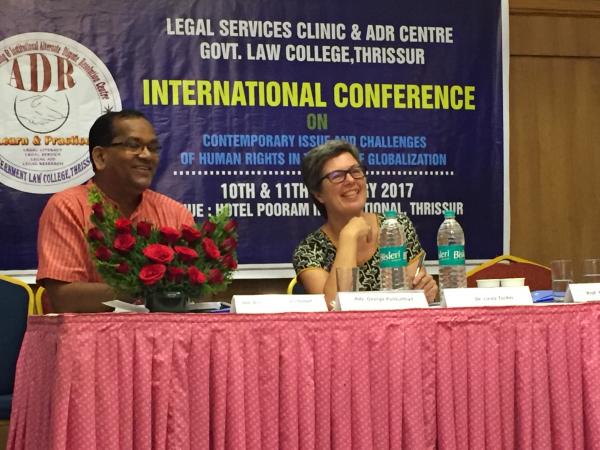George Pulikuthiyil and Dr Linda Tucker respond to questions from the floor, after Linda’s paper to
an International Human Rights Conference hosted by the Government Law College in Kerala.
One of the joys of working at Redfern Legal Centre is its active immersion in our community – both among fellow practitioners and those who use our services. Of course the indicators of disadvantage and barriers to justice are global, on a vast spectrum of scale, and so we can look outside our direct community to learn from others as to how best to work towards our central goal of improving access to justice.
On my recent holiday in India I was able to experience an inspiring human rights legal practice via a visit to Jananeethi Legal Institute in Kerala. Their work on human rights, gender violence, community legal education and therapeutic legal practices all resonate with our work at Redfern Legal Centre. While it was a holiday, I used the opportunity to get to know a group of dedicated, passionate and innovative human rights practitioners.
I spent some time at the Institute with its dynamic founder and CEO, George Pulikuthiyil, who invited me to attend the South Asian Human Rights conference, where I chaired one of the plenary sessions. I was also invited to an international conference on challenges of globalisation for human rights, where I gave a paper on globalisation, environmental law and intra-generational equity, based on doctoral work I did some years ago. A highlight was the opportunity to visit two law schools, where I gave talks to very engaged law students on human rights legal practice and our work at Redfern. I initially baulked at the time allocated – at least two hours on each occasion – but this was easily filled with questions and discussion (and lengthy selfie sessions afterwards!) pushing us well over time.
"... the work of the legal practitioners in India can educate and inspire us in our work at Redfern."
The South Asian Human Rights Conference featured distinguished human rights practitioners from India, South Korea, Thailand, Sri Lanka, Nepal and Malaysia. It was a blast to be with such a highly experienced, passionate group of women and men, with decades of domestic and international practice between them. They effortlessly articulated the mind-boggling injustices facing those who live with disadvantage in their communities, while wryly dissecting the failures of political, legislative and judicial decision makers. We heard of a case of young women languishing on remand for years while waiting for an interpreter who works in their dialect so their case can be heard; and a judgement of a state high court which clearly sympathised with the brother of a woman who married outside her caste and so was ‘pressured’ to commit multiple murders in response.
The globalisation conference again brought together people from around Asia as well as the US, along with local activists and practitioners, exploring rights-based theory and practice. I was asked to speak about my doctoral work, given its focus on intra-generational equity and the impact of national and international environmental law on local management and use of biodiversity. This is a long way from my current employment and discrimination law practice at Redfern so I was worried it may fall flat but the issues of gaps between policy and legal regimes and local realities resonates with much human rights practice and the need to work closely and respectfully with our clients and communities.
I hope this trip will be the start of ongoing links between our centre and Jananeethi and its community; we can learn so much from what the Indian practitioners deal with. We share the common law legal system and many of the same underlying issues, including poverty, gender violence, inequity and discrimination, but the extremes of both the issues and the work of the legal practitioners in India can educate and inspire us in our work at Redfern.
Dr Linda Tucker is Redfern Legal Centre's Discrimination and Employment Solicitor.



